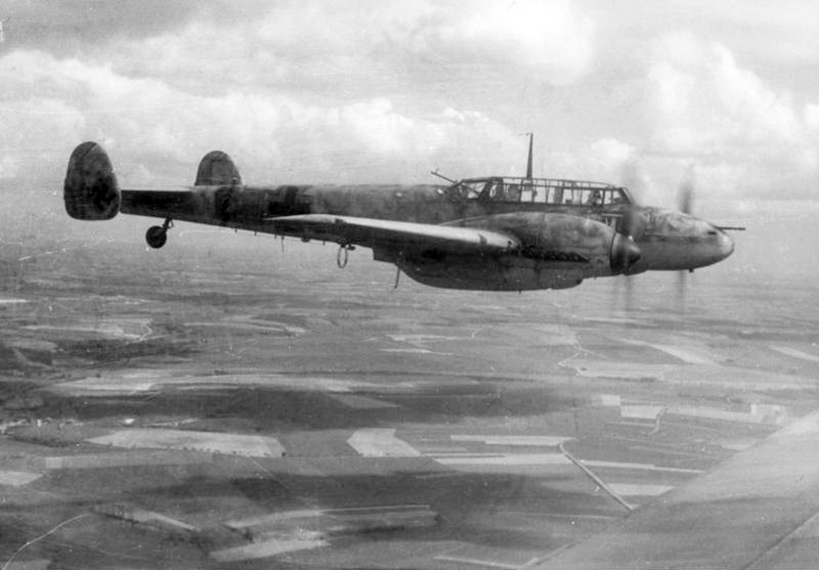Unwin, George Cecil "Grumpy"
- Date of birth:
- January 18th, 1913 (Bolton upon Dearne/Yorkshire, Great Britain)
- Date of death:
- June 29th, 2006 (Dorset, Great Britain)
- Service number:
- 46298
- Nationality:
- British
Biography
George "Grumpy" Unwin was born on January 18th, 1913. He joined the RAF in April 1929 as an Apprentice Clerk at RAF Records, Ruislip. On April 24th, 1931 he was posted to HQ Fighting Area, Uxbridge as a Clerk.
He applied for pilot training, was selected and on November 25 1935 he began his Elementary Flying School in Woodley. He moved on to 11 FTS, Wittering on February 17th, 1936 and with training completed, Unwin was posted to 19 Squadron at Duxford.
He was active over Dunkirk at the end of May and June 1940 an shot down a Hs 126, a BF 109 a Bf 110 and some (shared) probable’s.
He kept adding victories in August, and Autumn of 1940. At the end of 1940, his score was 13 destroyed and 2 shared destroyed. He wouldn't shoot down enemy planes in the latter parts of the war
Unwin applied for a commission early 1941. At first he was turned down, until a friend advised him to discuss hunting and race horses in a cultured fashion, at the next selection board interview.
George stated that he had grown up around horses, and proceeded to present to the panel his wealth of knowledge in this area. At the end of it, he had earned his commission.
His service-wide nickname was "Grumpy"; received, as the story goes, after he complained about late night efforts of squadron mate Douglas Bader repairing one of his leg prostheses. It kept Unwin awake and he let all and sundry know about it.
Unwin was made instructor and converted to fly Mosquitos in 1943. After a spell at 60 OTU, High Ercall, Unwin joined 613 Squadron at Lasham on April 5th, 1944.
With his tour completed, he went to Central Gunnery Schools, Catfoss late 1944 and Leconfield late 1945. Unwin was posted to 608 Squadron, RauxAF at Thornaby in June 1946, as Chief Instructor. He had a staff job at HQ 23 Group from September 1947 until January 1949 and another at HQ 12 Group until August 1949.
Unwin was then posted overseas and on September 9th, he took command of 84 Squadron at Habbaniya.
The squadron moved to Tengah on April 8th, 1950 and began operations in support of the Army against terrorists in Malaya. Unwin led the squadron until August 24th, 1951, when he broke a leg and returned to the UK. For distinguished service in Malaya, he was awarded the DSO. Unwin retired from the RAF on January 18th, 1961, as a Wing Commander.
In retirement Unwin was the Controller of Spastics Appeals for the southern counties, but he never considered that to be work.
A passionate golfer with a handicap of six, he lived within walking distance of the Ferndown Club, in Dorset, where he served for many years on numerous committees. In earlier days he played seven days a week, once commenting: "I cut it down to five times in winter." He continued playing until he was 90, but visited the club two or three times a week until his death.
Do you have more information about this person? Inform us!
- Period:
- Second World War (1939-1945)
- Rank:
- Flight Sergeant
- Unit:
- No. 19 Squadron, Royal Air Force
- Awarded on:
- October 1st, 1940
"This airman has displayed great courage in his attacks against the enemy and has destroyed ten of their aircraft. On a recent occasion, when returning from an engagement alone, he intercepted a formation of
enemy bombers escorted by about thirty fighters, and destroyed two of the fighters. He has displayed skill and courage of the highest order."
- Period:
- Second World War (1939-1945)
- Rank:
- Flight Sergeant
- Unit:
- No. 19 Squadron, Royal Air Force
- Awarded on:
- December 6th, 1940
"This airman has shown the greatest keenness, courage and determination to engage the enemy. He is an outstanding fighter pilot and has destroyed a total of thirteen enemy aircraft and assisted in the destruction of others."
Second DFM awardes as a bar for on the ribbon of the first DFM.
- Period:
- Second World War (1939-1945)
- Period:
- Second World War (1939-1945)
- Period:
- Second World War (1939-1945)
Sources
- - SHORES, CH. & WILLIAMS, C., Aces High, Grub Street, London, 1994.
- The London Gazette Issue 34958 published on the 1 October 1940
- The London Gazette Issue 35009 published on the 6 December 1940
- National Heritage Memorial Fund
- The Times - Obituaries
- The South East Echo








